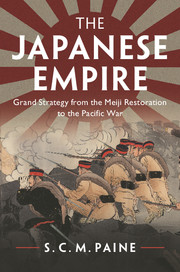Book contents
- Frontmatter
- Dedication
- Contents
- List of Maps
- Acknowledgments
- Maps
- 1 The Meiji Generation
- 2 The First Sino- Japanese War (1894– 1895)
- 3 The Russo- Japanese War (1904– 1905)
- 4 The Transition from a Maritime to a Continental Security Paradigm
- 5 The Second Sino- Japanese War (1931– 1941)
- 6 The General Asian War (1941– 1945)
- 7 Japan betwixt Maritime and Continental World Orders
- Select Bibliography
- Index
2 - The First Sino- Japanese War (1894– 1895)
Published online by Cambridge University Press: 31 March 2017
- Frontmatter
- Dedication
- Contents
- List of Maps
- Acknowledgments
- Maps
- 1 The Meiji Generation
- 2 The First Sino- Japanese War (1894– 1895)
- 3 The Russo- Japanese War (1904– 1905)
- 4 The Transition from a Maritime to a Continental Security Paradigm
- 5 The Second Sino- Japanese War (1931– 1941)
- 6 The General Asian War (1941– 1945)
- 7 Japan betwixt Maritime and Continental World Orders
- Select Bibliography
- Index
Summary
Most people are surprised … while possessing as she does some of the finest types of modern warships, the Chinese army is still in many respects absolutely what it was three hundred years ago – merely an armed undisciplined horde.
Sir Robert Hart (1835–1911), inspector general, Imperial Maritime Customs for China (1863–1908), interview in 1892With passionate effort the Japanese have ransacked the Western world for its treasures of knowledge, and have vigorously applied what they have learned.
The Times, London, 1894, on the eve of the First Sino-Japanese WarJapan westernized, China did not, and there were consequences. Although in the eighteenth century the ruling Manchus had created the richest empire in human history and the second-largest in Chinese history, by the nineteenth century they were on the decline just as Japan began its ascent and the West had reached its stride. An unprecedented wave of internal rebellions wracked China followed by a succession of regional wars. In this period, China's government had great difficulty setting feasible strategic goals and then matching a grand strategy to secure them. In contrast, Japan's leaders laid plans to use the window of opportunity between treaty revision and the completion of the Trans-Siberian Railway to pre-empt Russia by seizing Korea from a failing China. While Japanese leaders’ stated goals emphasized the restoration of order and the protection of Japanese nationals in Korea, their much more important unstated goals concerned the larger issue of the regional balance of power, which they intended to overturn at Chinese and Russian expense.
Underlying and Proximate Causes
Wars arise from underlying and proximate causes. The underlying causes are the tinder composed of the belligerents’ mutually exclusive objectives, while the proximate causes serve as the lit match of immediate grievances setting off the conflagration. Many people identify the last proximate cause as the reason for the outbreak of hostilities, when in fact it is just the last in a long succession that finally ignited the accumulation of underlying tensions. Although a specific event may trigger hostilities, it occurs against a backdrop of issues setting the belligerents at cross-purposes. These underlying causes constitute the real reasons for war, not the headline-grabbing provocations.
- Type
- Chapter
- Information
- The Japanese EmpireGrand Strategy from the Meiji Restoration to the Pacific War, pp. 15 - 48Publisher: Cambridge University PressPrint publication year: 2017
- 1
- Cited by



